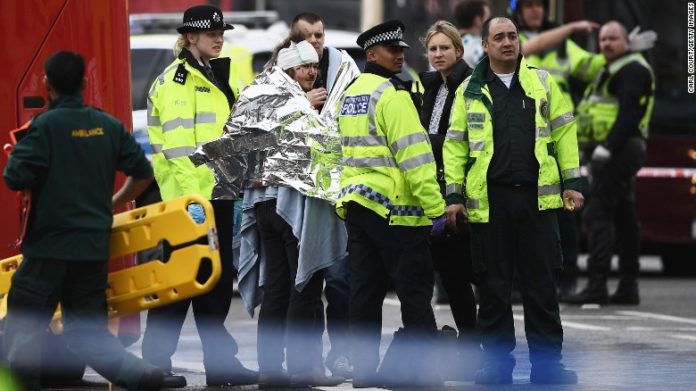Earlier this week, London saw its worst terror attack since the suicide attacks of 2005. Recent tallies show that five were killed and 40 injured in the grizzly attack. The people who died as a result of the assault included Aysha Farde who is a British national and US tourist Kurt Cochran. 75-year-old Leslie Rhodes who was from Clapham in South London died from injuries resulting from the attack the following day. In what appears to be an act specifically to cause panic amongst the British people, the Wednesday attack had the perpetrator hit pedestrians along the Westminster Bridge. Afterward, he publicly stabbed Policeman Keith Palmer.
Members of the British police began investigations immediately after the attacker had been neutralized. Prime Minister Theresa May said the UK Terror threat level would remain at severe, which is the second-highest and means another attack is highly likely. The people injured in the wake of the incident included 12 British nationals, three French schoolchildren, two Romanians, four South Koreans, two Greeks and one national each from Germany, Poland, the Irish Republic, China, Italy and the United States.
After a series of investigations, law enforcement members were finally able to identify the Wednesday afternoon attacker as 52-year-old Khalid Masood. The Islamic State have since come out to claim responsibility for the incident. However, British investigators believe Masood was acting independently. The Mi5 have spoken to the press and said that the man had already been perceived to be a threat to the public. However, members of law enforcement regarded him as not posing a very significant threat and as such had him low on their watch list.
Born on December 25th, 1964 in Kent, England, Khalid Masood was first called Adrian Russell Elms, the name that his parents used to add him to the birth registry of the Dartford District of Kent. Later on, his mother married a man named Ajao, and as such, he also went under the name Adrian Russell Ajao over his childhood and further life. The attacker took on the name Masood when he converted to Islam.
Mr. Khalid has had a past of criminal activity. In his most recent arrest, he was indicted and convicted for the possession of a knife. He served his sentence and was released in December 2003. From then, he has not been convicted again. Additionally, Masood has some history in the Middle East. He spent some years working in Saudi Arabia as a teacher of English as a second language. He taught at the General Authority of Civil Aviation in the Port of Jeddah.
The attacker stayed in a room at a hotel in Brighton on the night before the attack. Afterward, he gave his occupation as a teacher when renting out the car that he used to carry out the attack. The Department of Education, however, said that it had no record of Masood working as a qualified English teacher in the state’s schools.
According to Theresa May, Masood had been “once investigated in relation to concerns about violent extremism.” However, he was a “peripheral figure” and, as such, not part of the current intelligence picture.” The attacker has on previous occasions been held in three different jails including HMP Lewes, Waylands and Ford.
The method of attack the assailant used has often been encouraged by al-Qaeda in the Arabian Peninsula as well as the Islamic State. In the online magazines published by these organizations, the method is described as sufficient for creating panic amongst the public. The method of attack is easy to apply and can only be detected once it happens. As such, the attacker probably preferred it because bigger planned projects are usually discovered and stopped in their tracks by the Mi5.
The preparation of the British police, as well as counter-terrorism units across the United Kingdom for terrorist attacks, has continuously grown since the suicide attacks of 2005. These efforts were increased even further following the attacks in Mumbai in 2008 and acts of terrorism that have followed in other areas such as France and Nice. Law enforcement has become increasingly aware that these acts of terrorism have statistically been done more by immigrants. As such, the British government would want to choose to reduce their immigration population in recent years. For that to happen, however, there has been one problem – the UK’s EU membership.
Member countries of the European Union, apart from having a single trade market and environmental standards expected to be maintained by every country, also have a freedom of movement policy. That means citizens of countries that are in the EU can move from one member country to another without restriction. Although that could be advantageous in the lines of trade and tourism, it could pose a security concern if those moving are planning to reside in the countries they have moved to. This could prove to be an opportunity for terrorists masquerading as legal immigrants the space to wreak their acts of terror all across the EU.
Additionally, the EU has refugee policies which means that any member country could be required to take in the citizens of other nations whose own nations are politically unstable due to war. Turkey, for example, took in refugees from Syria. However, without proper guidelines as to how authorities should screen those coming into the country seeking asylum, it is quite difficult to differentiate between genuine refugees and potential terrorists. Further, there is also the possibility that even genuine refugees or immigrants could become radicalized while residing in other countries. As such, terrorist groups can use these newly radicalized people to conduct their acts of terror on other countries, hiding behind their previous credibility.
For the terror problem associated with immigrants, the UK has picked up a potential solution to terror. Reduce the immigrants by leaving the EU. Statistically, reduction of immigrants was one of the key reasons to a Yes vote in the referendum held as to the Brexit decision. This means it could probably make the country safer over the years, albeit to an extent.
As investigations continue as to the reasons behind Masood conducting this heinous act, the United Kingdom is set to begin the process of leaving the EU on March 29th. In as much as this incident was caused by a British national, the decision is likely to aid the country in combatting future acts of terrorism.




